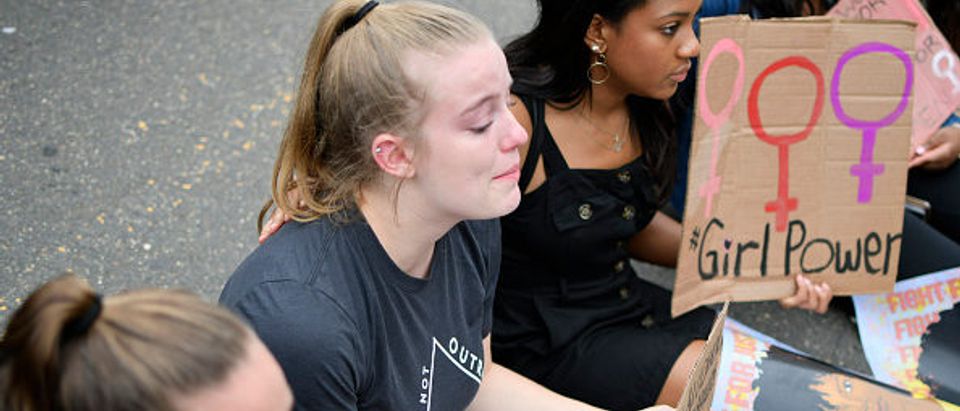At the height of the Kavanaugh hearings, I was an invited speaker to a group of Capitol Hill staffers, some working for members of Congress who were key figures in the hearings. I asked the women staffers for their perspective.
The women’s response can be summarized in a single sentence: The #MeToo movement was founded on justified anger against men willing to use their power against women for sexual purposes, but now the movement is being betrayed and weaponized for political advantage.
And the biggest losers are women.
What we learned from the bizarre Kavanaugh circus is how deeply liberal activists are committed to the feminist narrative of men as villains and women as victims.
This feminist animus shapes the reaction to virtually any accusation against men today. Even when an accusation is not backed up by any corroborating evidence, many leading opinion-makers buy in without question.
And small wonder: America’s major social institutions from universities to government to media to Hollywood are heavily invested in advancing a divisive paradigm that demonizes men just for being men.
Many universities offer courses and conferences on “Toxic Masculinity.” The Claremont Colleges consortium announced an event by warning, “Masculinity can be extremely toxic to our mental health.”
A Salon article advises, “The three most destructive words a father or mother can tell their young son? ‘Be a man.'”
In the Washington Post, Suzanna Walters, director of the Women’s, Gender and Sexuality Studies Program at Northeastern University, wrote an article titled, “Why Can’t We Hate Men?”
The professor wrote, “We have every right to hate you. You have done us wrong. #BecausePatriarchy.”
The same message is being preached to hundreds of thousands of college students every day in universities across the nation. The fact that Walters’s article was published in an established, national newspaper is a measure of how socially acceptable it has become to treat masculinity as inherently dangerous and defective.
Camille Paglia, herself a feminist, has argued that feminism should not be about denigrating men. In Time magazine, she wrote, “A peevish, grudging rancor against men has been one of the most unpalatable and unjust features of second- and third-wave feminism. Men’s faults, failings, and foibles have been seized on and magnified into gruesome bills of indictment.”
What feminists fail to understand is that their indictment of men is harmful not only to men but also to women. Paglia goes on: “When an educated culture routinely denigrates masculinity and manhood, then women will be perpetually stuck with boys, who have no incentive to mature or to honor their commitments.”
Already far too many boys are failing to mature into men. In “Saving Our Sons,” family counselor Michael Gurian summarizes some of the sobering findings:
- More boys than girls are diagnosed with learning disabilities (276 boys for every 100 girls)
- More boys than girls are labeled “emotionally disturbed” (324 boys for every 100 girls).
- More boys than girls are suspended from school (215 boys for every 100 girls).
- More boys than girls are expelled from school (297 boys for every 100 girls).
And the numbers keep stacking up: More boys than girls suffer from drug or alcohol addiction, commit suicide, are victims of violence, and end up in the school-to-prison pipeline.
In nearly every area of K-12 public schooling — grades, test scores, extra-curricular leadership — boys are falling behind. And the same pattern continues in higher education:
- Fewer men than women earn a bachelor’s degree (75 men for every 100 women).
- Fewer men than women earn a master’s degree (66 men for every 100 women).
- Fewer men than women earn a doctoral degree (91 men for every 100 women). In fact, in 2017women earned a majority of doctoral degrees for the 9th straight year in a row.
In today’s climate of political correctness, it is extremely difficult to get people to acknowledge these disturbing statistics. It violates the dogma of male privilege.
Yet men and women are interdependent. Boys who grow up unmotivated, underachieving, depressed, isolated, and suicidal often do harm to others—especially those closest to them.
When boys hurt, they hurt others.
Paglia is right. Boys who fail to launch do not become the kind of men who respect women and honor their responsibilities, who rise to the challenge of becoming trustworthy husbands and fathers.
The Kavanaugh hearing became a referendum on whether masculinity is presumptively toxic. What feminists need to understand is that when manhood itself is attacked, the collateral damage on women is massive.
And no amount of political correctness can wish that away.
Nancy Pearcey is the author of the recently released Love Thy Body: Answering Hard Questions about Life and Sexuality. She is editor-at-large of The Pearcey Report and a professor and scholar in residence at Houston Baptist University.
The views and opinions expressed in this commentary are those of the author and do not reflect the official position of The Daily Caller.


